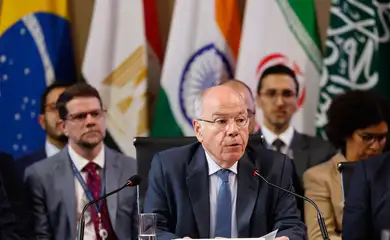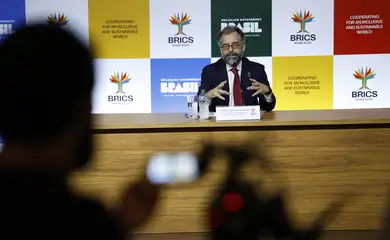BRICS: Foreign ministers reach consensus against trade protectionism

The meeting of BRICS foreign ministers ended on Tuesday (Apr. 29) without a joint statement. However, according to Brazilian Foreign Minister Mauro Vieira, the 11 member countries and other invited participants reached a consensus in opposing the global tariff war.

“I would like to highlight the firm rejection by all participants of the resurgence of trade protectionism and the use of non-tariff measures under environmental pretexts. There was also a shared view that reforming the WTO [World Trade Organization] and fully restoring its dispute settlement body are essential,” said Vieira.
When asked whether the tariff dispute between China and the United States could benefit Brazil, the minister chose instead to emphasize the country’s commitment to respecting international trade rules.
“Brazil and China share a very important relationship. We also have longstanding ties with other countries, such as Argentina, with over 200 years of history. We always seek relations based on international law and respect for the rules. That’s the path we will continue to follow—always open to dialogue with all,” he said.
The final document of the meeting in Rio de Janeiro was signed only by the Brazilian BRICS presidency. “We decided to issue a presidential declaration, as is common at many meetings, specifically to leave room for careful and precise negotiations on the joint statement to be released in July, during the summit of heads of state,” explained Mauro Vieira.
Priority agendas
The Brazilian foreign minister emphasized that the meeting in Rio was marked by strong political engagement and a focus on advancing a solutions-oriented agenda for both the BRICS and the Global South—particularly significant in a year when Brazil is set to host the 30th United Nations Climate Change Conference (COP30).
Indonesia took part in a BRICS meeting for the first time as a full member—an occasion welcomed as a reflection of the group’s commitment to greater diversity, representativeness, and global justice.
Vieira addressed the various calls for strengthening the United Nations (UN), particularly its Security Council. The group advocates for greater representation of Asia, Africa, and Latin America in all multilateral systems, including the World Trade Organization (WTO), the International Monetary Fund (IMF), and the World Bank.
The foreign minister warned that without a new global cooperation framework, critical challenges cannot be effectively addressed. He emphasized key areas such as health, the climate crisis, and the governance of artificial intelligence. According to Mauro Vieira, these are sectors where BRICS can take a leading role and coordinate concrete actions.



